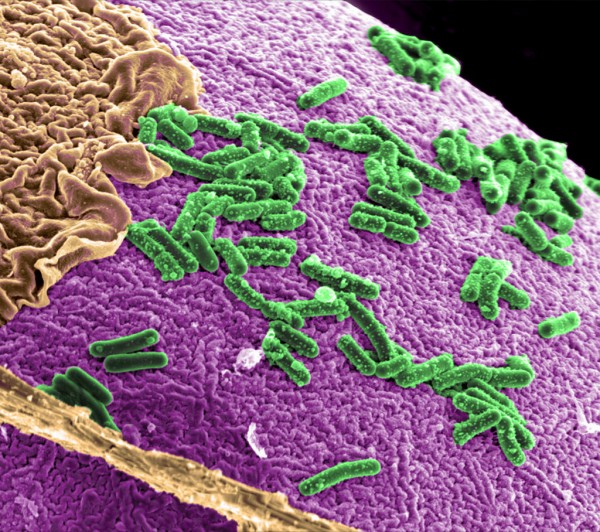By Dane Lorica, | December 03, 2016

Researchers have discovered that gut bacteria affects the manifestation of the symptoms of Parkinson's disease. (Pacific Northwest National Laboratory - PNNL / CC BY-NC-SA 2.0)
A pioneering study about gut bacteria and how they play a role in the manifestation of Parkinson's has been published in the journal Cell.
Researchers from Europe and the United States used laboratory mice to examine the effects of gut bacteria on the expression of symptoms related to the impairing brain disorder. This study included microbes naturally present in the animal's gut and those taken from human suffering from the disease.
Like Us on Facebook
The study included three different controlled tests to reveal the link between the microbes and the brain disease.
In the first experiment, two set of genetically modified lab animals that can produce an excessive amount of alpha-synuclein were used. The first set of mice carried complete gut bacteria while the other had zero. According to the results of the study, the brain of the germ-free mice did not accumulate excessive protein making the motor performance of the animal better compared to those that carried complete microbiome.
The second test involved feeding the animals with short-chain fatty acids that are produced by gut microbes. The goal was to determine if the mice carrying zero microbes will manifest the signs of the disease with the induction of mimicked bacterial activity. This resulted in the manifestation of symptoms of the brain disorder. The researchers concluded that certain chemicals produced by microbes could worsen the case of Parkinson's.
The third experiment included the introduction of gut bacteria from human patients and healthy humans. The animals were given microbes from human patients automatically showed symptoms of the disease while those given bacteria from healthy humans did not manifest the symptoms. This may suggest that people suffering from Parkinson's have certain microbes that contribute to the manifestation of the disorder or certain good bacteria are not present in their guts.
The result of the study sheds light on a revolutionary way of addressing the problem by directly targeting the gut instead of the brain. Scientists plan to use the latest discovery to develop future probiotics.
Sarkis Mazmanian, a microbiology professor from the California Institute of Technology, said: "one can imagine one day, maybe in our lifetimes, patients will be prescribed drugs, and in the pills will be the bacteria that protect them from disease or even maybe treat their disease symptoms."
Parkinson's disease is one of the most concerning neurodegenerative disorders across the globe. The condition causes the brain cells to form a conglomeration of a protein called alpha-synuclein. Due to this, the patient losses motor function and suffers from unrestrained shaking and tremors. Hence, the disorder results in both mental and physical debilitation.
In the U.S., approximately one million people are diagnosed with the disease while 10 million patients are reported worldwide making Parkinson's the second most common neurodegenerative disorder after Alzheimer's. Although the disease is rarely inherited, it can be triggered by environmental factors such as chemicals or exposure to head trauma.
Dr. Mazmanian said that the discovery of the link "reveals that a neurodegenerative disease may have its origins in the gut and not only in the brain as had been previously thought."
Dr. Patrick Lewis of the University of Reading added that the findings provide an idea for future research to examine the stomach of individuals suffering from Parkinson's. "It could provide really important insights into what happens in disease and potentially a new area of biology to target in trying to slow down or halt the changes in the brain," he stated.
-
Use of Coronavirus Pandemic Drones Raises Privacy Concerns: Drones Spread Fear, Local Officials Say

-
Coronavirus Hampers The Delivery Of Lockheed Martin F-35 Stealth Fighters For 2020

-
Instagram Speeds Up Plans to Add Account Memorialization Feature Due to COVID-19 Deaths

-
NASA: Perseverance Plans to Bring 'Mars Rock' to Earth in 2031

-
600 Dead And 3,000 In The Hospital as Iranians Believed Drinking High-Concentrations of Alcohol Can Cure The Coronavirus

-
600 Dead And 3,000 In The Hospital as Iranians Believed Drinking High-Concentrations of Alcohol Can Cure The Coronavirus

-
COVID-19: Doctors, Nurses Use Virtual Reality to Learn New Skills in Treating Coronavirus Patients







